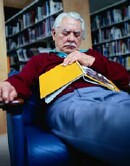 |
 |
 |

Daytime Sleeping Linked to Poor Recovery in Older Patients
Study found it predicted outcome months after patient went home|
|
HealthDay
By Krisha McCoy
Tuesday, September 2, 2008
 MONDAY, Sept. 1 (HealthDay News) -- Older patients who sleep during the day while in rehabilitation have less functional recovery, new research shows.
MONDAY, Sept. 1 (HealthDay News) -- Older patients who sleep during the day while in rehabilitation have less functional recovery, new research shows.
For the study, which was expected to be published in the Sept. 1 issue of Sleep, scientists tracked the sleeping patterns and other predictors of recovery (e.g., mental status, hours of therapy received, reason for admission) in 245 older adults (average age 80.6 years) who had been admitted for rehabilitation following an incident such as an orthopedic problem, a heart problem, or a stroke.
Sleep measurements were taken in the days after admission to the rehabilitation facility, and again three months later.
The researchers found that the participants slept for an average of 2.1 hours during the daytime, which represents 15.8 percent of the time between waking up and bedtime. Those who had higher percentages of daytime sleep showed significantly less functional recovery, even after the researchers adjusted for other predictors of recovery. And more daytime sleeping remained a predictor of less recovery at the three-month follow-up.
"We were surprised that the results suggested that it was the excessive daytime sleeping in the rehabilitation facility which was associated with less improvement in their physical functioning," said principal investigator Cathy A. Alessi, of the VA Greater Los Angeles Healthcare System and the UCLA David Geffen School of Medicine, said in a university news release. "We were also surprised by how long this effect lasted. For up to three months later, more sleeping during the daytime while they were in the rehabilitation facility was still related to their physical functioning after being discharged."
The researchers speculated that people's sleep may be disrupted while they are in the hospital due to existing medical conditions, sleep disorders, or environmental factors. Furthermore, it may be that daytime sleeping triggers decreased motivation and effort expended during therapy sessions, which could hinder recovery during rehabilitation.
These findings are important, since older people who are admitted to the hospital due to an illness or injury sometimes require a period of therapy and recovery in a rehabilitation facility (e.g., nursing home) before returning home.
Unlike mental status or hospital readmission, which are difficult or impossible to change, sleep is a predictor for rehabilitation outcomes that can be modified. Interventions to improve sleep in older people during rehabilitation may promote better recovery after an illness or injury.
HealthDay
Copyright (c) 2008 ScoutNews, LLC. All rights reserved.
Related News:
More News on this Date
Related MedlinePlus Pages:
| Home | Health Topics | Drugs & Supplements | Encyclopedia | Dictionary | News | Directories | Other Resources | |
| Disclaimers | Copyright | Privacy | Accessibility | Quality Guidelines U.S. National Library of Medicine, 8600 Rockville Pike, Bethesda, MD 20894 National Institutes of Health | Department of Health & Human Services |
Date last updated: 03 September 2008 |




